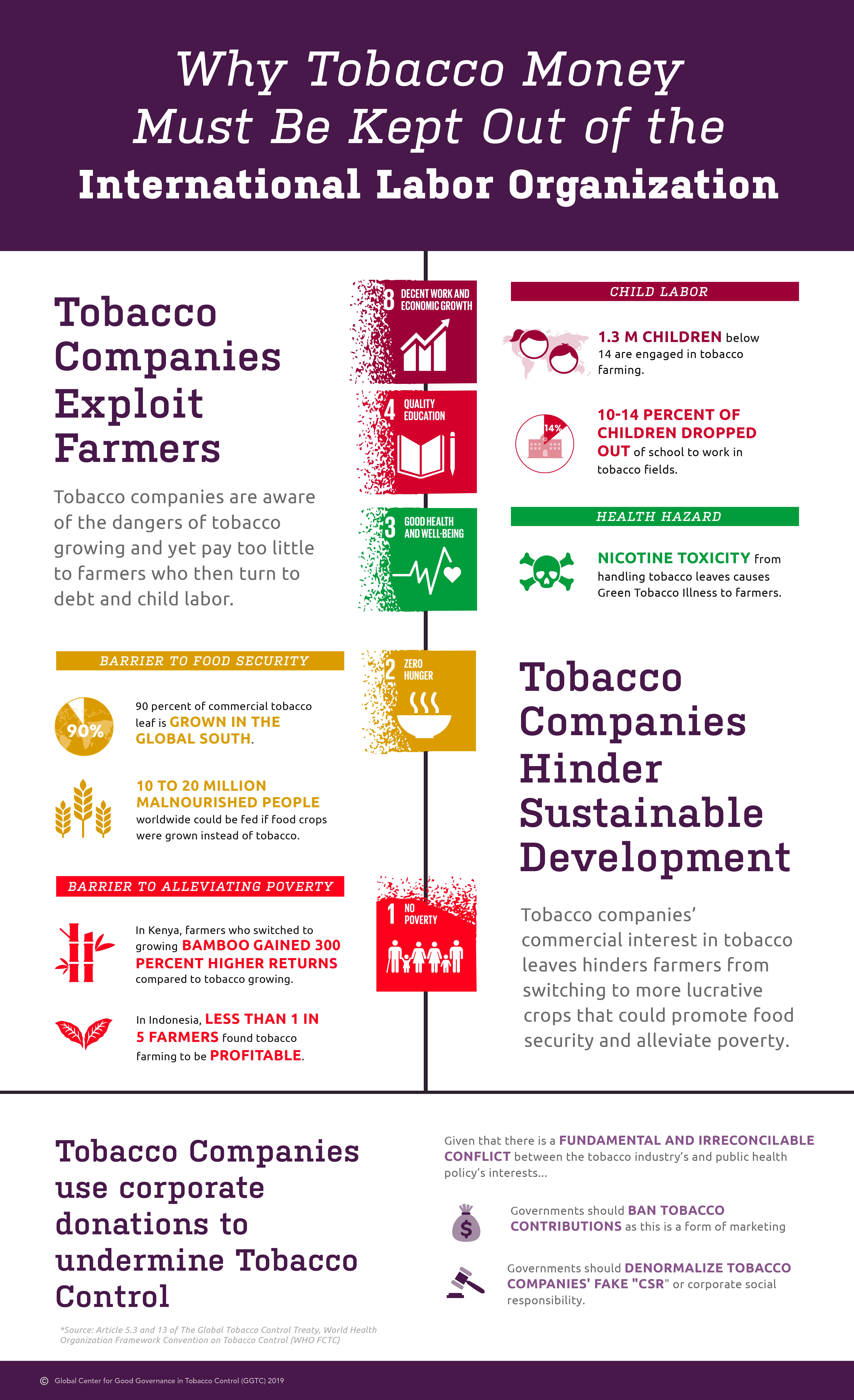FOR IMMEDIATE RELEASE:
Groups Call on ILO to Reject Tobacco Funding

Bangkok (30 October, 2019)— Global public health groups called on the ILO Governing Body to reject tobacco donations and tap tobacco taxes as funding source; as well as to espouse strict regulations on labor standards in order to eliminate concerns such as hazardous working conditions and child labor.
The letter addressed to the “Director General of the ILO and the Government Members” who are currently in Geneva for the 337th Session of the Governing Body; reveals that British American Tobacco, Japan Tobacco International, and Philip Morris International, had granted, in a span of a decade until 2018, about 15 million US dollars to the International Labor Organization (ILO) as part of a global effort to rehabilitate their image. And that the cost of the companies’ deadly products to society in that period is 12 Trillion US dollars. In the letter, tobacco companies are called out for “diverting attention from the fact that tobacco production and consumption hinders progress towards the Sustainable Development Goals (SDGs); claiming, on an annual basis, 8 million lives, and leaving behind a devastating trail of social, economic, environmental and health harms.”
Working documents of the ILO meeting also reveal that during a working group meeting in Kampala in July, the Employers Sector’s, representing industry interests, continued lobby for the ILO to “closely engage and cooperate with the… industry” to which the Workers Sector did not consent to.[i] The ILO Governing Body, which decided not to renew past contracts with the tobacco industry, is now tasked to consider a 3-year strategy costed at US$1.67M to be funded from multi and bilateral aid for development cooperation, prioritizing Malawi, Zambia, Tanzania, and Uganda.
Civil society supports the ILO’s proposal to exclude tobacco funding from its strategy to address tobacco labor issues because “ILO must not be complicit in tobacco industry’s marketing strategies” and “persistent poor working environment and unfair bargaining conditions of tobacco workers, that leads to child labor; can be traced back to the multinational tobacco companies.”
In August, amid the controversy surrounding an outgoing high level UN official’s promotion of tobacco partnerships, the UN Secretary General issued a memo to the officials of the UN system encouraging them to adopt the “Model policy for agencies of the United Nations system on preventing tobacco industry interference” and reject tobacco funding and partnerships. In October last year, the governing body of another treaty, the World Health Organization’s Framework Convention on Tobacco control called on governments “to promote tobacco control policy coherence in the governing bodies of the relevant intergovernmental organizations, including ILO.”
The health groups comprise of organizations working on global health issues including coalitions serving around 400 civil society organizations across 150 countries. The organizations signing the letter, led by STOP (Stopping Tobacco Organizations and Products), include Action for Smoking and Health, US, Campaign for Tobacco Free Kids, Corporate Accountability International Framework Convention Alliance, Johns Hopkins Institute for Global Tobacco Control, NCD Alliance, and World Heart Federation.
[i]Notes from proceedings of the
| Technical Meeting to Promote an Exchange of Views on the Further Development and Implementation of the Integrated Strategy to Address Decent Work Deficits in the Tobacco Sector (Kampala, Uganda, 3–5 July 2019) |
- She further enquired if the Workers’ group had any reservations to including a reference to the industry in the fourth point, which would say “The ILO should closely engage and cooperate with the social partners and the industry in the design and implementation of programmes to promote decent work and social dialogue in the tobacco sector at the international and national levels.”
- The Worker Vice-Chairperson stated that it was not necessary to refer explicitly to the industry in the fourth point as his group considered the industry to be part of the social partners.
- The Employer Vice-Chairperson regretted the response of the Workers’ group and decided to withdraw all four points of consensus in their entirety.








